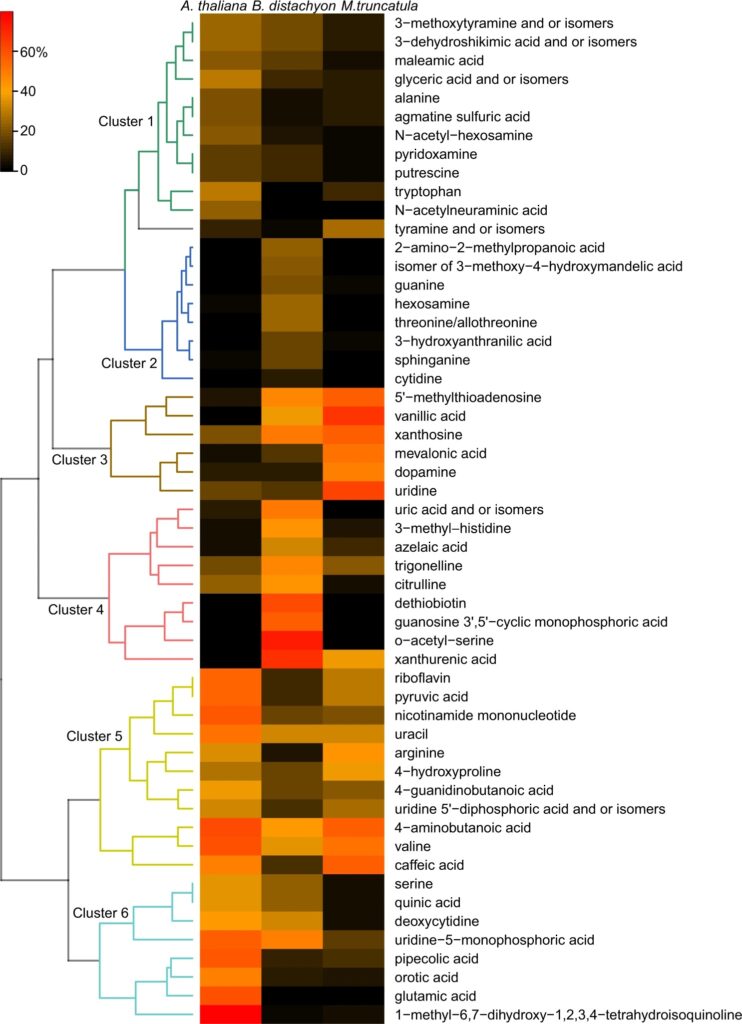The Science
Studying a plant’s metabolome, or the complete set of small molecules in a biological sample, provides a snapshot of the plant’s metabolic profile at a given time, and is a key tool for understanding how plants respond to environmental changes and stressors. It reveals metabolites that can be linked to specific traits or functions, which can be useful for crop improvement and other applications. In particular, studying root exudates—the suite of substances secreted by plant roots—and or how they respond to different environmental changes is important because root exudates provide a major source of soil organics and recruit beneficial microbes. In this study, m-CAFEs scientists compared the root metabolome and root exudate metabolome of three plant species: A. thaliana, B. distachyon, and M. truncatula. The metabolites were collected and analyzed from the root tissue and root exudates to explore the effects of environmental conditions on the metabolome. This work identified a core set of metabolites that were common between root and exudate tissues of the various species as well as found metabolites that were unique to each.

The Impact
Growth conditions and sampling techniques can greatly impact the metabolite profiles of plants. This work addresses the importance of taking these into consideration when performing plant metabolomics experiments. While the researchers did not cover all possible growth conditions, they were able to uncover the effects of medium supplementation and sterility as well as daily cycles and time-point of sample collection. Their findings add to the methodological and conceptual groundwork for future studies to improve understanding of plant-microbe interactions, with significant implications for scientific research in agriculture, soil science and plant science.
Summary
Here, m-CAFEs researchers performed metabolomics analyses on three different plant species to uncover the effects of growth conditions and to determine the core metabolome of the root and exudate metabolomes, or the key metabolites common to tissues and exudates across several species. Using liquid chromatography–mass spectrometry (LC-MS/MS) as a technique for separating and detecting metabolites based on their physicochemical properties, researchers identified a number of metabolites that were common between the three species as well as metabolites unique to each while measuring metabolite changes over time, and diurnal cycles, and in response to various sterility conditions and medium supplementation.
Contact
Trent R. Northen Environmental Genomics and Systems Biology Division, Lawrence Berkeley National Lab trnorthen@lbl.gov

Joelle Sasse
Institute for Plant and Microbial Biology, University of Zurich, Zurich, Switzerland jschlaepfer@botinst.uzh.ch
Funding
This work was supported by an NSF grant to University of California Berkeley (NSF Proposal 1617020), a grant of the Swiss National Science Foundation (SNSF, Proposal PR00P3_185831), the m-CAFEs Microbial Community Analysis & Functional Evaluation in Soils, (m-CAFEs@lbl.gov) a Science Focus Area led by Lawrence Berkeley National Laboratory under contract number DE-AC02-05CH11231.
Publications
McLaughlin, Sarah, Zhalnina, Kateryna, Kosina, Suzanne, Northen, Trent R., and Sasse, Joelle. The core metabolome and root exudation dynamics of three phylogenetically distinct plant species. United Kingdom: N. p., 2023. Web. doi:10.1038/s41467-023-37164-x. OSTI: 1963348
Related Links
Northen Lab Website: “Recent paper describes novel concept of a root and exudate core metabolome in plants.”
